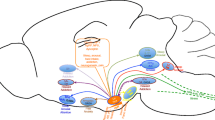Abstract.
The hypothalamus regulates diverse physiological functions, including the control of energy metabolism, circadian rhythms, stress and anxiety, sexual and reproductive behaviors. An overview of the most prevalent hypothalamus-enriched mRNAs revealed that this area of the brain specializes in producing intercellular signaling molecules. Two new secreted peptides derived from a single neuropeptide precursor, named hypocretins and orexins by two different groups, are synthesized in a small set of neurons in the perifornical area of the hypothalamus. Intracerebroventricular injection of the hypocretins/orexins increases food consumption in rats. Here we review recent progress in identifying the role of the hypocretins/orexins in the control of energy balance and in other physiological systems.
Similar content being viewed by others
Author information
Authors and Affiliations
Additional information
Received 28 December 1998; received after revision 10 June 1999; accepted 11 June 1999
Rights and permissions
About this article
Cite this article
de Lecea, L., Sutcliffe, J. The hypocretins/orexins: novel hypothalamic neuropeptides involved in different physiological systems . CMLS, Cell. Mol. Life Sci. 56, 473–480 (1999). https://doi.org/10.1007/s000180050446
Issue Date:
DOI: https://doi.org/10.1007/s000180050446



